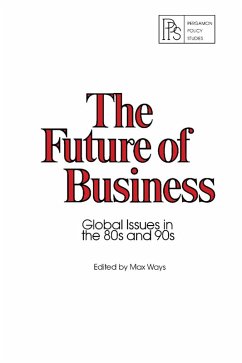The Future of Business: Global Issues in the 80s and 90s examines the future material, social, and intellectual vigor of business in the United States. The opportunities and problems facing business are analyzed, with emphasis on the basic forces and trends-both internal and external to business-that will largely shape it in the coming decades and their implications for society in general.
This book is comprised of five chapters and begins with the argument that business corporations must be able to articulate a set of guiding principles that relate their conduct to the whole range of human aspirations, not just to material abundance or economic considerations alone. The next chapter predicts the future of business based on its international condition and its situation as it is affected by other parts of the societies in which it operates. The role played by business, especially multinational corporations, in the post-1945 expansion of international trade-referred to as ""the new imperialism""-is then discussed, along with the importance of business to government and vice versa; the implications for business of the change from fixed-age retirement to flexible-age retirement; and the future of business-government relations. The final chapter explores a number of economic issues, their implications for politics, the imperative of international cooperation, and the role of business in helping to solve them.
This monograph will be of interest to businessmen, business leaders, consumers, employees, politicians, and the general public.
This book is comprised of five chapters and begins with the argument that business corporations must be able to articulate a set of guiding principles that relate their conduct to the whole range of human aspirations, not just to material abundance or economic considerations alone. The next chapter predicts the future of business based on its international condition and its situation as it is affected by other parts of the societies in which it operates. The role played by business, especially multinational corporations, in the post-1945 expansion of international trade-referred to as ""the new imperialism""-is then discussed, along with the importance of business to government and vice versa; the implications for business of the change from fixed-age retirement to flexible-age retirement; and the future of business-government relations. The final chapter explores a number of economic issues, their implications for politics, the imperative of international cooperation, and the role of business in helping to solve them.
This monograph will be of interest to businessmen, business leaders, consumers, employees, politicians, and the general public.
Dieser Download kann aus rechtlichen Gründen nur mit Rechnungsadresse in A, B, BG, CY, CZ, D, DK, EW, E, FIN, F, GR, HR, H, IRL, I, LT, L, LR, M, NL, PL, P, R, S, SLO, SK ausgeliefert werden.









